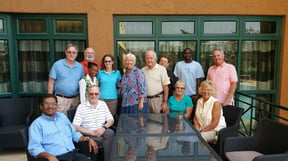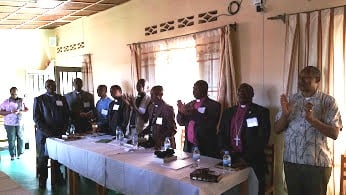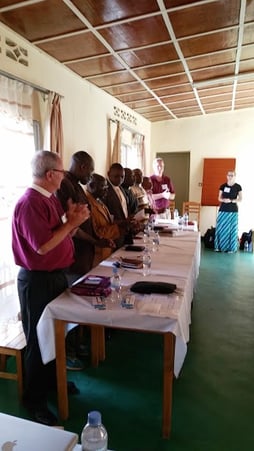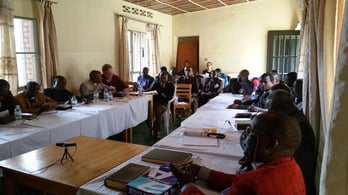The Society in Action
 The entire team, minus Sheryl Curbow Shaw who had not arrived yet, meeting in Kilgali, Rwanda, before launching to their respective training sites.
The entire team, minus Sheryl Curbow Shaw who had not arrived yet, meeting in Kilgali, Rwanda, before launching to their respective training sites.
The team arrived and went right to work, despite some logistical hurdles thrown at them, including flight adjustments and luggage issues. The team beautifully adapted the plan and started classes today.
Their goal is to train the trainers for the African churches participating and to strengthen the partnerships through fellowship. I am proud to be part of a society so true to its vision. But don't take my word for it: read it yourself.
(Copied from the Mission Website, http://www.theamia.org/vision.html)
OUR PEOPLE OF MISSION
By definition, a missionary society is a religious organization dedicated to the support of Christian mission, such as evangelism, education, economic development (see Note 1) and church planting. This model has biblical origins that can be traced back to Acts chapter 13, when Paul and Barnabas were identified by the Holy Spirit and sent out by the church in Antioch on what would become Paul’s first missionary journey. As described earlier, Patrick and his successors further embodied this missional approach to Ireland, and it has continued throughout the history of the Church.
Organized in this manner, The Mission stands in the great tradition of furthering the mission of the Church as a society of mission and apostolic works. With a single-minded focus, The Mission is “stripped down for mission, and not wearing Saul’s armor!” (Bishop John Rogers). (See note 2) Guided and held in trust by wise and faithful Christian leaders, including the guardianship and oversight by the founding Anglican Archbishops through a leadership body known as the ‘College of Consultors,’ (See note 3) The Mission is characterized by lean structures and a bent toward action in evangelism and apostolic works, primarily through the work of church planting. As a people, mission is what we do, and society is how we organize.
 Archbishop Kolini, Bishop Masimongo, Bishop Bahati, and Clergy participants. Mrs. Freda Kolini is in the far left of the picture.
Archbishop Kolini, Bishop Masimongo, Bishop Bahati, and Clergy participants. Mrs. Freda Kolini is in the far left of the picture.
Note 1: We introduced several bishops to economic development ideas with partners such as Echo Farms and an engineering firm that use windmills to pump water when they visited Winter Springs, FL.
Note 2: Bishops, priests, deacons, and lay people building the Kingdom of God through fellowship and partnership.
Note 3: Leadership and Oversight that provides a direct connection to the Anglican Communion. The pictures illustrate what a society looks like in action.
The most amazing piece of the puzzle is the cross pollination. As we travel to help train them, they are helping transform us. (See Bishop Carl's BLOG post, Our Partner Relationships-Invaluable!)
Please continue to pray for the team, the participants, the training and the unscheduled meeting with the House of Bishops in Tanzania. I will share more about the details when I have them.
Clint+
Want to know more about this conference's namesake, Apolo? (See Apolo Bio and Prayer Guide for Mission)


